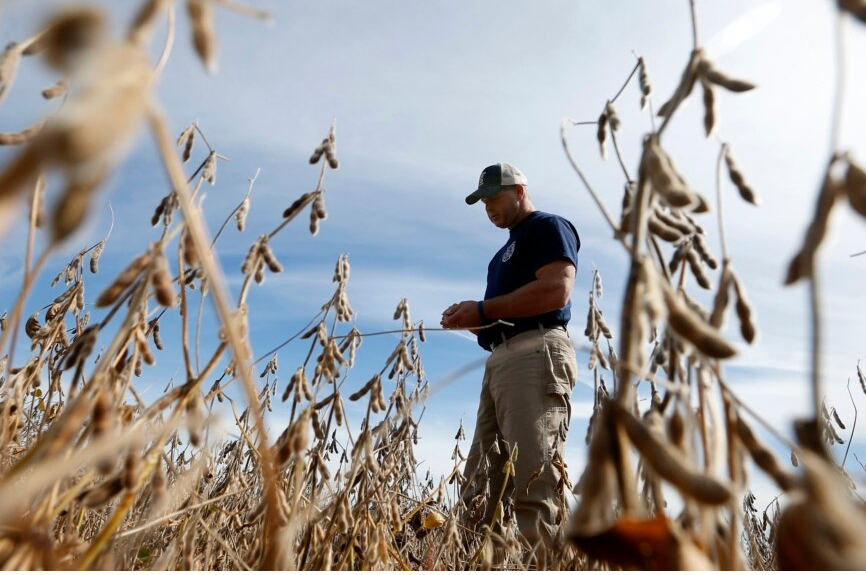
With the threat of Trump's tariffs looming, the US agriculture sector is expected to be one of the main sectors affected by tariffs, which is making many in the industry and market traders nervous. While there is still disagreement over the timing and scale of the Trump administration's tariffs on the EU, Mexico, Canada, China and even Russia, traders, analysts and US farmers are preparing in the same way they did in 2018, when the last trade war began. The tariff plan under the Trump administration has had a profound negative impact on the US agricultural market, causing it to fall into economic distress.
First, tariffs significantly raise the cost of agricultural production. The Trump administration's tariffs on imported steel and aluminum products have directly led to American farmers having to pay higher prices for farm machinery equipment, maintenance parts and other related production materials. Agriculture is a capital-intensive industry, and farmers need to invest heavily in machinery and infrastructure. The sharp rise in costs has severely weakened farmers' profitability and made farming more difficult. For example, some large farmers in the Midwest of the United States had to pay additional tariffs when they bought new tractors and harvesters, which undoubtedly greatly increased their financial burden.
Second, retaliatory tariffs triggered by the trade war have hit US agricultural exports hard. The United States is one of the world's largest exporters of agricultural products, with China, the European Union, Canada and other major markets. However, in response to the US tariffs, these countries and regions have also imposed retaliatory tariffs on US agricultural products. For example, China has imposed steep tariffs on US soybeans, causing US soybean exports to plummet. Soybean is one of the most important agricultural exports for the United States, and the collapse in prices and reduced demand has left many soybean farmers facing reduced incomes. According to statistics, between 2018 and 2019, U.S. soybean exports fell by nearly 50%, and soybean farmers' earnings were hit hard.
Third, market uncertainty has contributed to a cautious approach to investment in agriculture. The volatility of tariff policies and trade disputes has made the agricultural market full of uncertainty. It is difficult for farmers and agribusinesses to predict future market conditions and price movements when making long-term investment and production plans. This uncertainty discourages investment in the agricultural sector, affecting the efficiency and ability of agricultural production to expand. For example, many farmers put off upgrading equipment and investing in technology because they are unsure of future market demand and profitability.
In addition, disruptions in global supply chains have negatively impacted U.S. agriculture. Tariff policies and trade wars have caused changes in global trade flows and disrupted supply chains. U.S. agricultural exporters face higher costs and longer shipping times as they seek alternative markets and adjust logistics routes. This not only increases the complexity of exports, but may also lead to a decline in the quality of agricultural products during transportation, further weakening their market competitiveness. For example, some fruit and vegetable exporters have to face the risk of product decay and loss due to logistics delays.
Finally, tariffs have knock-on effects on rural economies. Agriculture is the main economic pillar of many rural areas in the United States, and the negative impact of tariffs is not limited to farmers, but also affects related agricultural service industries, such as farm machinery sales, warehousing and transportation, processing and packaging. With the decline in farm income, the volume of business in these industries has also declined, resulting in slower employment and economic growth in rural areas. Shops, restaurants, schools, etc. in rural communities will also suffer as a result of the decline in economic activity.
In summary, the Trump administration's tariff plan has hit the U.S. agricultural market in all directions, leaving it in economic distress by raising production costs, hitting export markets, increasing market uncertainty, disrupting global supply chains, and having ripple effects on rural economies. This has not only affected farmers' earnings and the stability of agricultural production, but also had a profound impact on the overall economy and society of the United States.

報告顯示,中國電力投資加速增長,預計2024年電網基建投資將超過5300億元。
近日,市場迎來了一則引人注目的消息:工業巨頭3M公司(MMM.N)在本周五公布了其季度業績報告,隨後股價飆升至近兩年來的
最近,外媒給OpenAI算了筆賬,今年可能要血虧50億美元。
近日,巴黎奧運會和世界鐵人三項協會聯合發布了一項重大決定,宣布因塞納河水質污染問題,原定於近期進行的奧運會鐵人三項首次下
當地時間7月18日,法國巴黎發生了一起令人震驚的持刀襲警事件。
近期,一則重大消息在國際舞臺上引起軒然大波,馬來西亞宣布加入金磚國家。
調查發現,互聯網和智能手機的使用幹擾了韓國近五分之一學生的生活。